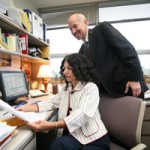The first draft of the Middle States Reaccreditation Self-Study was released Monday on the Ithaca College Web site for review by the campus community.

The study is an examination of the college’s goals and will be submitted this month as part of the Middle States Commission reaccreditation process.
The Middle States Commission is the accrediting organization for many northeast states, but also includes Pennsylvania, New Jersey, Maryland and Puerto Rico. There are 514 member colleges and universities of Middle States that work together to uphold ideals and standards among its members.
“It’s like a large scale peer review for universities and colleges,” said William Pelto, associate dean of the School of Music and co-chair of the study’s steering committee. Marian MacCurdy, professor of writing, also co-chairs the committee.
Middle States has 14 standards for accreditation, which were addressed in the six chapters of the Ithaca College self-study. The standards included leadership, educational offerings and assessments of student learning.
After it is reviewed by the campus community this month, the self-study will be sent to the Middle States Commission on Higher Education to reaccredit the college’s affiliation with Middle States. While Pelto doesn’t expect there to be any significant changes made to the study, a wider audience will provide more thoughts and opinions.
During the first week of March, a team of eight to 10 college leaders from Middle States will tour the campus to ask questions about the college. Their questions will be focused on the self-study, but any topic is open for discussion.
“The visit is vital,” Pelto said. “The visit is one of the culminating experiences of the self-study, which is the chance to discuss ourselves with this visiting team of peers.”
It has been 10 years since the college’s last accreditation. At that time, President Williams had just assumed the presidency and began work on the college’s institutional plan.
According to David Garcia, associate provost, the institutional plan has had “the biggest impact” in college policy since the college’s last self assessment.
“The plan helped the steering committee because it provides [the] framework for … much of the new things that happened over the past 10 years,” Garcia said.
Since its last accreditation, the college has also created a new vision and mission statement, and a total of seven new initiatives are listed as significant changes to the college — the institutional plan is listed first. Additionally, the college has conducted a comprehensive campaign, embracing “the concept of diversity” and “the value of sustainability.” Pelto said the steering committee guided and constructed the final 84-page document.
“It’s like a huge research paper,” Pelto said. “We started with the standards for Middle State. Based on those, the Steering Committee designed research questions that would answer, from the college’s perspective, the ways that we address those standards.”
Six task forces were formed in the summer of 2006 and collected data for a year on the college’s procedures. The study was written by more than 70 people from all campus constituencies.
“[The self-study] addresses all the standards required by Middle States, by means of demonstrating who we are as a campus and all of the things we do and based on the information gained from the task force,” Pelto said.
Senior Josh Keniston, student trustee, worked on the student learning task force.
“It’s been a lot of fun for me, and it’s helped shape what my future goals are,” Keniston said.
Keniston met with his task force once a week last year to discuss how the campus is achieving its goals.
“The task force was responsible for generating answers to the research questions. So, they were the people who went around to various offices to ask those questions,” Pelto said.
Before the task forces could begin collecting data on the college’s different functions, Pelto and MacCurdy designed the questions for which the task force would then find answers.
“It’s a very complex project, that requires planning from all levels,” MacCurdy said.
According to Pelto, the steering committee had to sift through about 400 pages of data and information compiled by the task forces. They then had to condense the information into an 84-page paper.
“To craft something that speaks to the essence of that, without totally diluting it, is really a challenge,” Pelto said.
Keniston, as the student trustee, provided his input on the student experience. He said he felt like his voice was being heard.
“I feel like they were really listening,” Keniston said. “I definitely feel like they took advantage of the knowledge I had as a student.”
Pelto expects to speak with the Student Government Association about the document.
“They are probably the best place for us to turn to for that kind of feedback,” Pelto said.
Pelto has worked on this study for three years — two years longer than the other task forces. He understands the value of accreditation.
“We value the fact that we uphold these standards, and, by identifying with the commission, those standards are printed, public, obvious and measurable for us,” Pelto said.







